Colloquia for Fall 2012
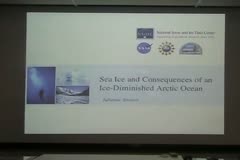
Sea Ice and Consequences of an Ice-Diminished Arctic Ocean
December 13, 2012
Julienne Stroeve
Hosted by Dave Randall
The Arctic is currently undergoing rapid environmental changes. Over the past few decades, the Arctic has warmed at about twice the rate as the rest of the planet. As a result, significant changes are happening in the Arctic sea ice cover, with potentially large implications not only regionally but also for the global climate. Arctic sea ice is an important regulator of the exchange of heat and…
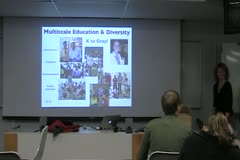
Climate Science Education, Outreach, and Diversity at CMMAP
November 29, 2012
Scott Denning
Hosted by Sonia Kreidenweis
CMMAP is one of 17 NSF Science and Technology Centers, developing and using multiscale models to better understand the climate system. A crucial part of every STC is to enhance education, engage external audiences about the research, and broaden participation in our field. We support an integrated effort to educate and engage diverse people from "K to Gray." The Little Shop of Physics is an…
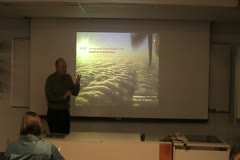
Entrainment in Stratocumulus
November 15, 2012
Hermann Gerber
Hosted by Jeff Collett
We know that stratocumulus clouds (Sc) contribute significantly to the EarthÂ’s radiation budget and thus must be understood for predicting climate change. This talk looks at relatively recent Sc measurements (POST; Physics of Stratocumulus Top) off the California coast that follow multiple other such efforts. The POST field campaign is a direct result of learning from earlier studies…
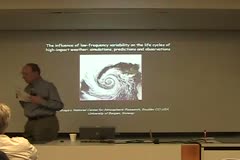
The influence of low-frequency variability on the life cycles of high-impact weather during the winters of 2009-2011: simulations, predictions and observations
November 08, 2012
Mel Shapiro
Hosted by Richard Johnson
It has been widely noted that the anomalously extreme weather events of the recent winter seasons coincided with large-amplitude sub-seasonal to seasonal anomalies, particularly in the arctic modes of variability, i.e., Northern Annular Mode and North Atlantic Oscillation. We hypothesize that these low- frequency variations were sufficient to alter the breaking behavior of the extratropical…
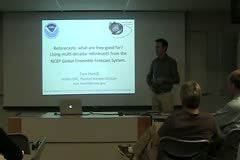
Reforecasts: what are they good for? Using multi-decadal reforecasts from the NCEP Global Ensemble Forecast System
November 01, 2012
Thomas M. Hamill
Hosted by Russ Schumacher
Reforecasts, or hindcasts, are retrospective numerical forecasts, ideally from the same model and data assimilation system that is used operationally. We have recently created a reforecast data set for the NCEP medium-range global ensemble forecast system (GEFS). For every day from 1985 to present, we have generated 11-member ensemble reforecasts for the 00Z cycle. The forecasts extend to 16…
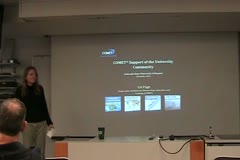
The COMET Program's Support of University Education
October 25, 2012
Liz Page
Hosted by Sue van den Heever
For over 20 years, COMET has engaged in a variety of educational activities in an effort to build a bridge between the academic and operational meteorology communities. With computer-based training, classroom courses, and support of operationally related research, COMET has worked with the university community to improve weather forecasting skill around the world. Originally formed to support…
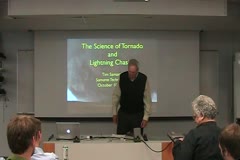
The Science of Tornado and Lightning Chasing
October 18, 2012
Tim Samaras
Hosted by Steve Rutledge
For the past 20 years, Samaras has combined his technical expertise to his passion of chasing storms to collect first-ever data and images from tornadoes and lightning. He will share the techniques he uses, some of the data he has collected and show some of the incredible imagery from logging 35,000 miles each year in Tornado Alley. He will briefly discuss what the future has in store for him.
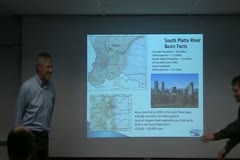
Colorado's Water History, Rights & Allocation System: A Climate-Driven System
October 11, 2012
Tom Cech
Hosted by Nolan Doesken
In 1859, gold was discovered along Cherry Creek in Denver, and set in motion an epic transformation of Colorado and the West. The "Great American Desert" soon became an irrigated garden of abundance, in spite of climatic challenges. In 1870, the first large-scale community irrigation system in America was developed by settlers of the Union Colony - today Greeley, Colorado. An irrigation ditch…
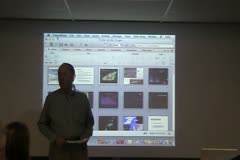
The Detailed Structure of the LaGrange, Wyoming Tornado Observed during VORTEX2
October 04, 2012
Roger Wakimoto
Hosted by Richard Johnson
One of the most ambitious field projects organized to study tornadoes and tornadic storms occurred during the spring and summer of 2009/2010 (VORTEX2 - Verification of the Origins of Tornadoes Experiment). A number of mobile platforms were deployed in a coordinated manner in order to increase the number of intercepts of tornadic storms. This seminar presents an analysis of a tornado that…
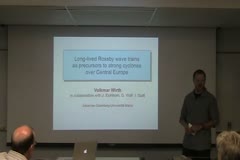
Long-lived Rossby wave trains as precursors to strong winter cyclones over Europe
September 26, 2012
Prof. Volkmar Wirth
Hosted by Thomas Birner
The statistical connection between strong surface cyclones over Europe and long-lived upper-tropospheric Rossby wave trains is examined for the Northern Hemisphere winter season using 45 years of reanalysis data. Dates are selected for which the surface pressure anomaly over Central Europe is below a threshold yielding the 5%-percentile of the lowest values. Composites of upper tropospheric…
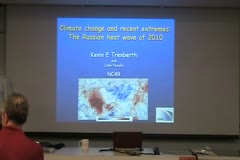
Climate change and recent climate extremes: The Russian Heat Wave of 2010
September 06, 2012
Kevin E. Trenberth
Hosted by Chris O’Dell
Following a discussion on the framing of how climate extremes relate to climate change, an examination will be given of a number of large impact climate extremes that occurred in 2010 and 2011. The main focus is on the Russian heat wave and the Pakistan floods, and how both were driven by natural variability, especially ENSO, and global warming from human influences. Together these resulted in…
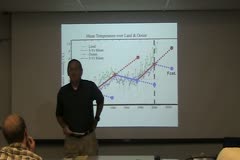
Deep Ocean Circulation Changes as the Primary Driver for Global Climate Change
August 30, 2012
Dr. William Gray
Hosted by Wayne Schubert
An important process with regards to climate change is the prevalence of multi-decadal periods of fluctuations in both global and local temperature, precipitation, and other climate elements. The usual period of these variations is about 50-70 years or roughly 25-35 years between low to high or high to low periods. The weather 25-35 years ago can often seem different from what we experience…
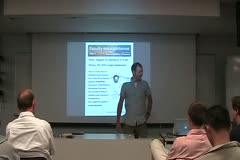
Faculty Intro Jamboree
August 23, 2012
Profs. Birner, Denning, Johnson, Kreidenweis, Kummerow, O'Dell, Robinson, Schumacher, Thompson
Hosted by ATS
Profs. Birner, Denning, Johnson, Kreidenweis, Kummerow, O'Dell, Robinson, Schumacher and Thompson provide overviews of their research areas and groups in the department.
